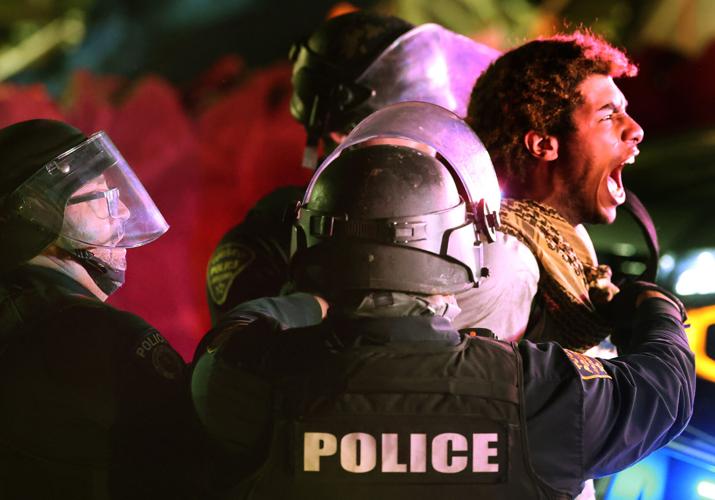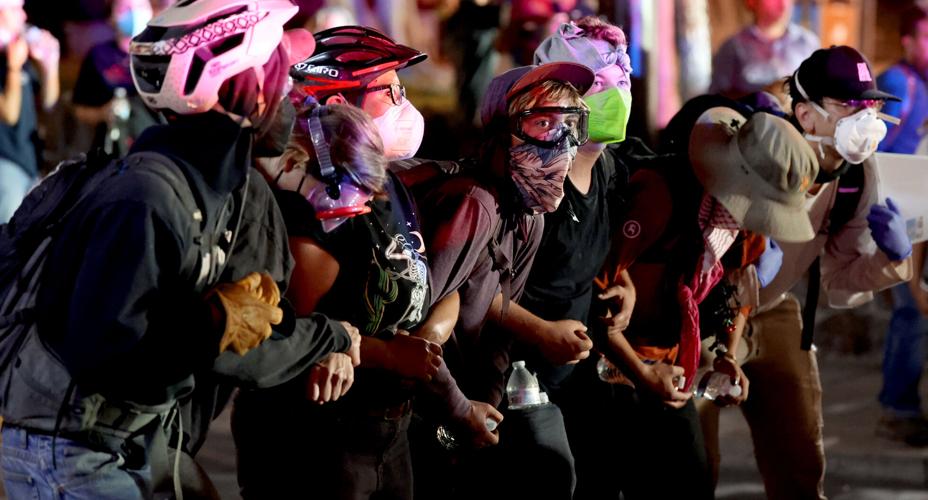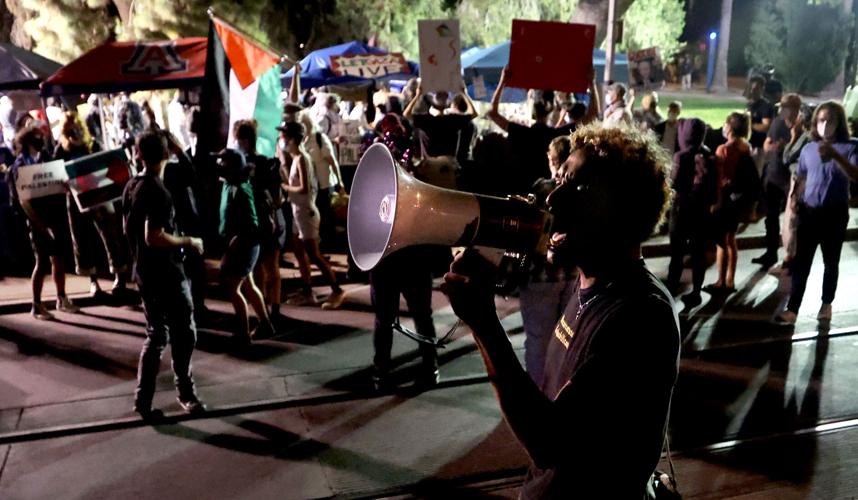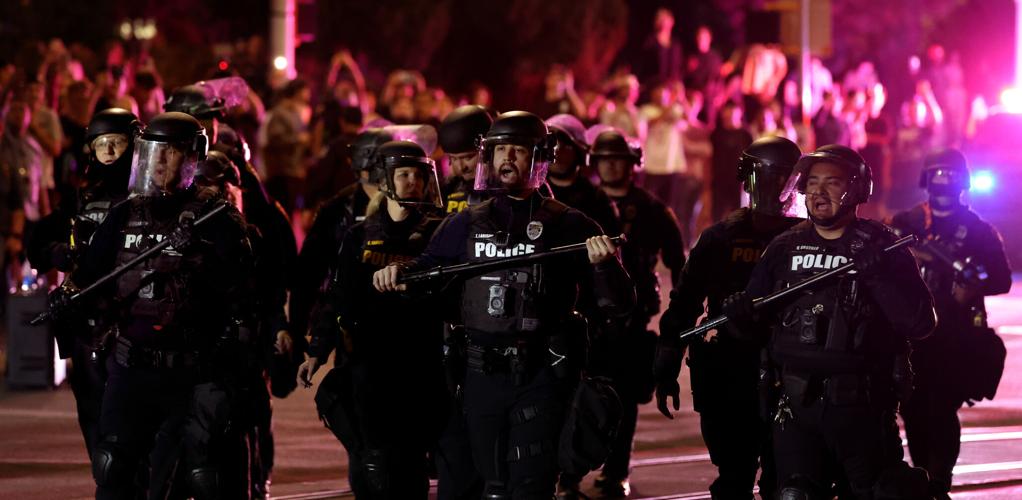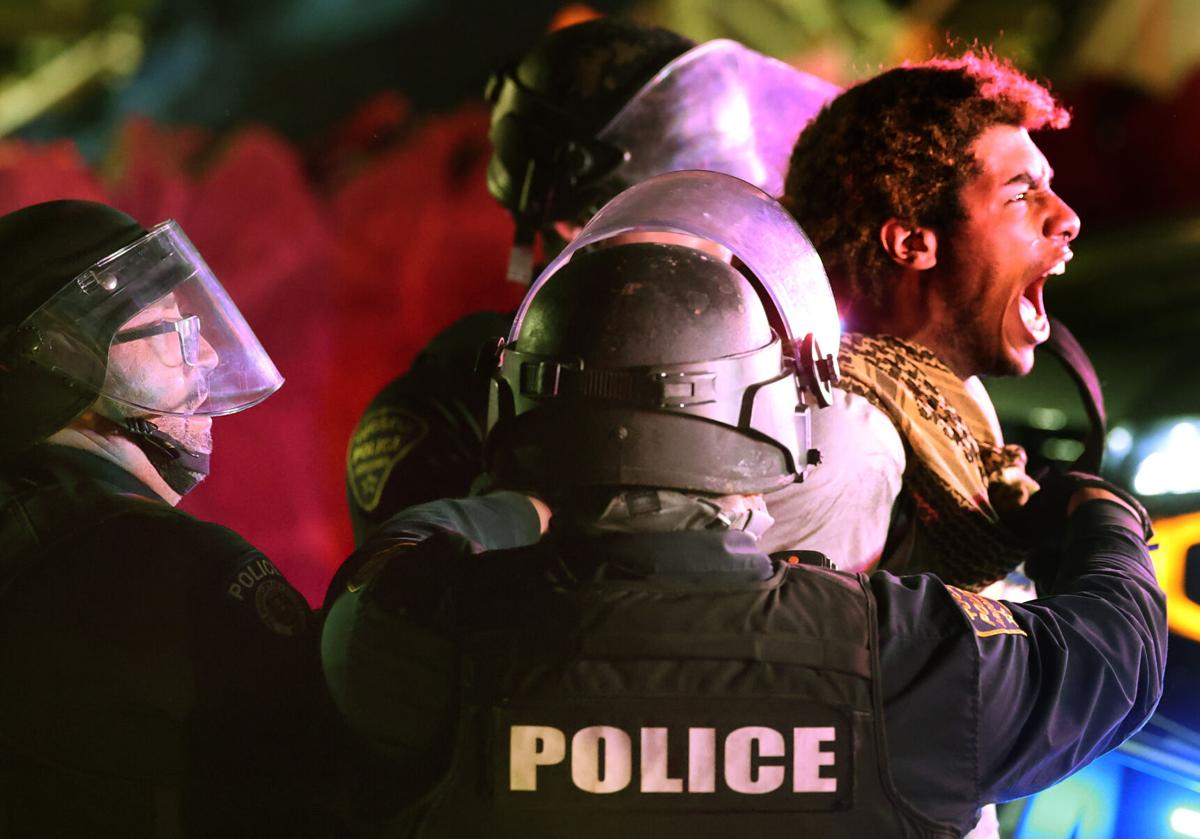Officers’ “minimal use” of pepper balls and rubber bullets in breaking up a protest camp at the University of Arizona early Wednesday was warranted due to “the dangerous actions of the protesters,” UA’s president says, but student government leaders disagree.
Four demonstrators were arrested at UA after an hours-long standoff with police, three for criminal trespass, and one for criminal trespass and aggravated assault against a peace officer, UA President Robert C. Robbins said.
One was an undergraduate student, another a graduate student, and two were unaffiliated with the university, he said. Their names were not made public. Protest organizers told the Arizona Daily Star on Wednesday afternoon that all those arrested have been released.
“Due to the dangerous actions of the protestors," Robbins said, "law enforcement had little choice but to take significant measures, including the wearing of tactical safety gear and a minimal use of pepper balls and rubber bullets to disperse the crowd and to protect themselves and others while clearing the area.
“By approximately 2:30 a.m., Park Avenue and the encampment were cleared,” he continued, referring to the one-day camp that pro-Palestinian protesters set up Tuesday near the UA main gate and next to Arizona State Museum. The protest, against Israel’s actions in its war with Hamas in Gaza, was organized by a group called Students Against Apartheid.
The standoff between police and the demonstrators lasted from about 10:30 p.m., when protesters defied a campus curfew for non-academic activities despite repeated warnings of arrests, to just before 2 a.m., when Robbins directed law enforcement officers to “immediately enforce campus use policies and all corresponding laws without further warning.”
Officers in riot gear fired the pepper balls and rubber bullets and began making arrests. The other protesters in the encampment immediately retreated and left.
Pro-Palestinian protestors at the University of Arizona retreat after arrests.
"Thankfully, as of this message, we are not aware of any significant injuries to students, faculty, staff, protestors, or members of law enforcement," Robbins wrote in his statement Wednesday afternoon, sent to students, faculty and staff.
During the standoff, “ ... Law enforcement members were assaulted with projectiles. In addition, hundreds of protestors and counter-protestors gathered on Park Avenue, creating a volatile environment. At my direction and in consultation with the University of Arizona Office of Public Safety and UAPD, supported by partner law enforcement agencies, a plan was implemented to clear the area with an emphasis on protecting everyone,” Robbins said.
Alyssa Sanchez, president of the Associated Students of the UA, and Jeremy Bernick, president of the Graduate and Professional Student Council, countered in a joint statement: “The use of force against peaceful students has never and will never deserve to have a place on our campus.”
The two students, who were elected to represent over 50,000 of their peers, said that “as student leaders … we will relentlessly push the administration to drop all potential code of conduct threats to students who have exercised their right to free expression this past week.”
“When campus police got involved in the 60’s against students protesting the war in Vietnam, in the 80’s against apartheid in South Africa, in the 2000’s against the Iraq War and in recent years with the Black Lives Matter movement; campus police always incite, escalate and perpetuate unnecessary and disproportionate violence on peaceful students,” Sanchez and Bernick wrote.
Robbins seemed to disagree.
“While freedom of speech and free expression are encouraged at our university, we will not allow students, faculty, staff, or outside agitators to violate the law or our policies and put anyone at risk,” he wrote.
After the demonstrators formed an encampment Monday on the UA Mall, “despite repeated, respectful and clear communication with protestors, the protestors once again violated campus use policies on Tuesday,” Robbins wrote.
“Again, after ongoing dialogue with protest organizers, University officials began a formal warning process. Officials communicated to protesters to remove unauthorized structures and disperse by 10:30 p.m. The university and members of law enforcement sought to avoid escalation of the situation and continued to provide repeated warnings, including the possibility of arrest. Protestors ignored the warning, continued to reinforce their encampment and chanted, ‘If you come in, we will fight you’.”
“ … As officers attempted to move protestors off Park Avenue, many physically resisted and additional projectiles were once again thrown at close range at officers,” Robbins continued.
Beginning immediately and lasting at least through May 15, Robbins said, “We will strictly enforce our campus use policies, including a prohibition on all non-permitted shade coverings, including canopies and tents.
“No events or large gatherings will be allowed on campus without a permit authorized in advance. I have directed Vice President and Chief Safety Officer Steve Patterson to review all permit requests.
“UAPD will take a zero-tolerance approach, acting swiftly and decisively to enforce our campus use policy, which can include issuing no warnings before taking action.”
Robbins said these steps show his commitment to safety and "continued operations of the university."
UA also fenced off grassy portions of its mall after Monday’s encampment there and posted “no trespassing” signs.
A Students Against Apartheid encampment organizer, first-year UA student Harlow Parkin, said the protesters, who are “demanding” among other steps that the UA divest from Israel and defund UA Police, are “even more energized.”
“We feel more motivated than we ever have,” said Parkin, who said he was hit in the head with a rubber bullet during the police actions early Wednesday.
“Though we were horrified by the administration’s response to our encampment and protests yesterday night, we are more grateful for the immense support of the UA and Tucson communities,” Parkin said.

A line of protesters link arms and brace for the next thrust from law enforcement breaking up a camp of pro-Palestinian protesters on the University of Arizona campus, May 1.
Photos: Pro-Palestinian protestors evicted from the University of Arizona campus
Pro-Palestine protest
Updated
Tucson Police take a protester into custody on Park Avenue as law enforcement personnel from several area agencies clear an encampment of pro-Palestinian protesters from the University of Arizona campus, May 1, 2024.
Pro-Palestine protest
Updated
A line of Pima County Sheriff’s deputies form a shield line as law enforcement gathers outside an encampment of pro-Palestinian protesters encamped on the University of Arizona campus, April 30, 2024, Tucson, Az. Hours later a line of officers pushed a couple hundred protestors up Park Avenue before the gathering broke up just before 3 a.m.
Pro-Palentine protest
Updated
A protestor exhorts an encampment of a protestors on the University of Arizona campus just before law enforcement showed up in force to remove them after a 10:30 p.m. deadline, April 30, 2024, Tucson, Az.
Pro-Palestine protest
Updated
A pro-Palestinian protester stands outside the main encampment on the University of Arizona campus, April 30, 2024, Tucson, Az.
Pro-Palestine protest
Updated
One of the group’s leaders walks Park Avenue urging on the protestors outside an encampment of pro-Palestinian protesters at the University of Arizona, April 30.
Pro-Palestine protest
Updated
Tucson Police drag a protestor out of the line and into custody as law enforcement clears an encampment of pro-Palestinian protesters from the University of Arizona campus, May 1, 2024, Tucson, Az.
Pro-Palestine protest
Updated
A line of about 100 law enforcement personnel move up Park Avenue as the last knots of pro-Palestinian protesters break up after being evicted from the University of Arizona campus, May 1, 2024, Tucson, Az.
Pro-Palestine protest
Updated
A journalist gets video of a line of Pima County Sheriff’s deputies, among the law enforcement agencies that massed to clear an encampment of pro-Palestinian protesters from the University of Arizona campus, May 1, 2024, Tucson, Az.
Pro-Palestine protest
Updated
A protestor gets ready as law enforcement begins to show up to remove their encampment of pro-Palestinian protesters from the University of Arizona campus, April 30, 2024, Tucson, Az.
Pro-Palestine protest
Updated
A protester yells at law enforcement officer from behind the barricades erected by pro-Palestinian protesters encamped on the University of Arizona campus, April 30, 2024, Tucson, Az.
Pro-Palestine protest
Updated
A protester holds the barricades as law enforcement approaches the makeshift wall of their encampment of pro-Palestinian protesters at the University of Arizona campus, April 30, 2024, Tucson, Az.
Pro-Palestine protest
Updated
A bystander has some pizza, one of thousands who showed up to watch law enforcement agencies clear an encampment of pro-Palestinian protesters from the University of Arizona campus, April 30, 2024, Tucson, Az.
Pro-Palestine protest
Updated
A throughly equipped protestor looks out of one of the gaps in the barricades, watching officers from several law enforcement agencies arriving to clear their wildcat encampment of pro-Palestinian protesters at the University of Arizona campus, April 30, 2024, Tucson, Az.
Pro-Palestine protest
Updated
A thrown water bottle glances off a law enforcement officer outside an encampment of pro-Palestinian protesters barricaded on the University of Arizona campus, April 30, 2024, Tucson, Az.
Pro-Palestine protest
Updated
A Pima County Sheriff’s deputy takes a break from the shield line as law enforcement officers gather outside an encampment of pro-Palestinian protesters at the University of Arizona campus, May 1, 2024, Tucson, Az.
Pro-Palestine protest
Updated
A line of Tucson Police officers advance on a the pack of a few hundred pro-Palestinian protesters gathered on Park Avenue outside the University of Arizona campus, May 1, 2024.
Pro-Palestine protest
Updated
A protestor climbs on a wall along Park Avenue to rally the group as law enforcement clears an encampment of pro-Palestinian protesters from the University of Arizona campus, May 1, 2024, Tucson, Az.
Pro-Palestine protest
Updated
A pro-Palestinian protester comes face to face with a line of Tucson Police officers, marching up Park Avenue helping to clear an encampment from the University of Arizona campus, May 1, 2024, Tucson, Az.
Pro-Palestine protest
Updated
A line of Tucson Police officers line up for their next thrust as law enforcement clears pro-Palestinian protesters from Park Avenue near the University of Arizona campus, May 1, 2024, Tucson, Az.
Pro-Palestine protest
Updated
A pro-Palestinian kneels in front of an officer with a chemical ammo gun as protesters face off with law enforcement outside the University of Arizona campus, May 1, 2024.
Pro-Palestine protest
Updated
A protester stands up to a line of law enforcement officer clearing an encampment of pro-Palestinian protesters from the University of Arizona campus, May 1, 2024, Tucson, Az.
Pro-Palestine protest
Updated
A protestor stands on a wall along Park Avenue to watch over an encampment of pro-Palestinian protesters facing off with law enforcement officers from several local agencies on the University of Arizona campus, April 30, 2024, Tucson, Az.
Pro-Palestine protest
Updated
A protestor is dragged out of the line on Park Avenue and into custody as law enforcement clears an encampment of pro-Palestinian protesters from the University of Arizona campus, May 1, 2024, Tucson, Az.
Pro-Palestine protest
Updated
Pima County Sheriff’s deputies pause and reform their line as they march through the remains of an encampment of pro-Palestinian protesters at the University of Arizona campus, May 1, 2024, Tucson, Az.
Pro-Palestine protest
Updated
A line of protesters link arms and brace for the next thrust from law enforcement breaking up a camp of pro-Palestinian protesters on the University of Arizona campus, May 1, 2024, Tucson, Az.
Pro-Palestine protest
Updated
Tucson Police officers hold the line in a push-and-shove scuffle with pro-Palestinian protesters encamped on the University of Arizona campus, May 1, 2024, Tucson, Az.
Pro-Palestine protest
Updated
Pro-Palestinian protesters link arms and retreat up Park Avenue as law enforcement herds them away from the University of Arizona campus, May 1, 2024, Tucson, Az.
Pro-Palestine protest
Updated
A pro-Palestinian protester walks with a Palestinian flag outside an encampment of protestors on the University of Arizona campus, April 30, 2024, Tucson, Az.
Palestine protest at Unviersity of Arizona
Updated
A handful of pro-Palestine protestors chant from behind their makeshift barricades during an occupation in the school’s Olive Grove at the University of Arizona, April 30, 2024, Tucson, Az. The encampment sprang up in the afternoon after a larger group was removed from the UA of Mall the night before.
Palestine protest at Unviersity of Arizona
Updated
University of Arizona assistant chief Mario Leon talks with a group of pro-Palestine protestors about returning the fencing the group appropriated to encircle their latest encampment in the school’s Olive Grove, April 30, 2024, Tucson, Az. An accord was eventually forged and the fence was taken away.
Palestine protest at Unviersity of Arizona
Updated
A protestor looks out through the fencing the group gathered to encircle their pro-Palestine encampment at the University of Arizona, April 30, 2024, Tucson, Az.
Palestine protest at Unviersity of Arizona
Updated
A protestor uses a megaphone to talk about some guideline for an pro-Palestine encampment in the University of Arizona Olive Grove, April 30, 2024, Tucson, Az.
Palestine protest at Unviersity of Arizona
Updated
A protestor sketches out a new sign from inside an encampment of pro-Palestine protestors at the University of Arizona, April 30, 2024, Tucson, Az.
Palestine protest at Unviersity of Arizona
Updated
Protestors remove the fence they took from a construction site on the University of Arizona campus to encircle their of pro-Palestine encampment in the school’s Olive Grove, April 30, 2024, Tucson, Az.

One of the group’s leaders walks Park Avenue urging on the protestors outside an encampment of pro-Palestinian protesters at the University of Arizona, April 30.

A line of Tucson Police officers advance on a the pack of a few hundred pro-Palestinian protesters gathered on Park Avenue outside the University of Arizona campus, May 1.


